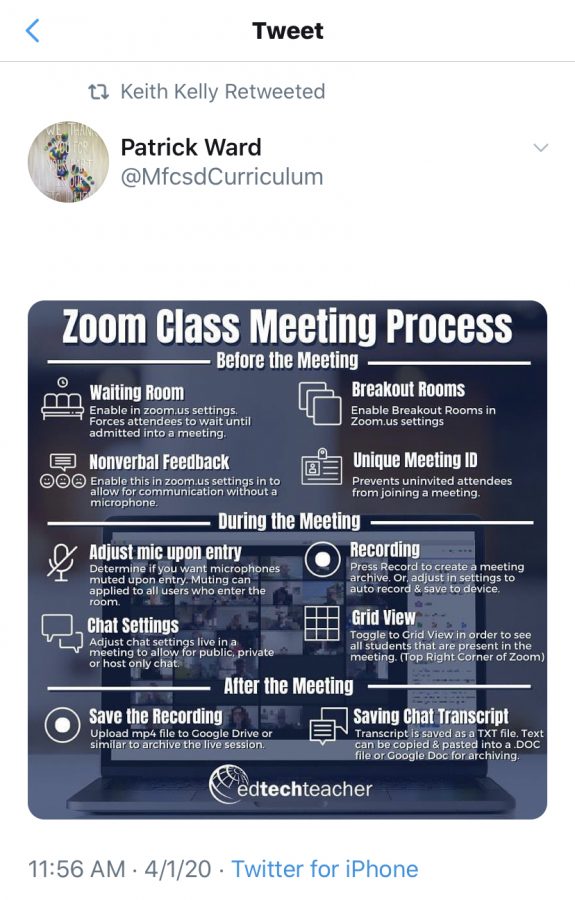Students struggle to understand distance learning material
Dr. Patrick Ward’s official Twitter account
Administration has encouraged staff to deliver instruction via Zoom video conferences, but students say that’s no substitute for classroom instruction.
April 20, 2020
Many students and staff have admitted they’re worried about how remote learning is actually affecting the students when it comes to the absorption of content.
Brittany Pumphrey, who teaches Government, Psychology and AP Psychology, believes students, teachers, and parents have had to work harder to find balance when it comes to doing schoolwork at home. She said, “I do believe that content mastery is going to take a backseat to some other more immediate needs during this time – and that’s okay.”
Being an AP teacher also causes Pumphrey to be more aware of other AP classes that her students may be taking. “I have been trying to minimize whatever I can, without sacrificing crucial information that will be needed for mastery of the course. I know many of my AP students are in several other AP classes, too, and that there is a lot on their plates,” said Pumphrey.
While Pumphrey has been trying to adjust her workload, junior Katie Voronkin feels that other teachers have not been as accommodating. Voronkin said, “I have been overwhelmed due to the amount of work teachers have been assigning, and I feel as though many of my teachers have not decreased the amount of work they assign and are forgetting that we have to teach these concepts to ourselves making it much more challenging.”
Alvin Cai, a junior who is taking multiple AP classes, also feels that there has been a major change in the absorption of content. Cai said, “I don’t think I am absorbing much of the review we do either, and I think the main problem for me is because of the environment. When I’m in school, there is nothing really better to do but work and learn. But when I’m at home, I feel less obligated to do work.”
When students have a difficult time with remote learning, Cai said it’s tough because everyone is stuck at home without direct access to his teachers. Cai said, “I personally don’t like learning online because I find being in an actual classroom with a teacher right in front of me engaging than a pre-recorded lecture or assigned video from Khan Academy.”
Brianna Mosely, a senior, also struggles with absorbing the material in this unprecedented time. Mosely said, “I’ve found it much more difficult to find the motivation to work in general, therefore making it altogether challenging to get the material to stick in my brain. I’ve found that if I don’t want to learn the material, then I won’t.”
Much like Mosely, Voronkin also has challenges when absorbing the material. Voronkin said, “I find it very difficult to comprehend and totally understand concepts when I am teaching it to myself. I also find it very difficult to remember what I have been learning about since I’m no longer in the classroom environment.”
To keep themselves on track with their learning, Mosley thinks students have had to employ better coping skills. “Sometimes when I start on my work, I’ll feel the temptation to go back to relaxing,” she said. “In those moments, I have to use this skill called Opposite-action/urge-surfing which is exactly as it sounds: do the opposite of your temptation is/ride the urge of not doing your homework and simply being mindful of it. In the end, I feel much better.”
This is a difficult time, according to Pumphrey, but making sure that students have the best mental and physical health as possible is vital. She said, “All the changes that we’ve had the past few weeks are a big deal. Everyone is trying their best, but your best might look or be different from mine – no one’s situation is the same right now, and it’s important to keep that in mind.”
Pumphrey said everyone needs to remember that people are confused, frustrated, and scared. She said, “In that elevated state, it’s sometimes challenging to remember to just take a breath and slow down, but oftentimes that is something super simple that can then put things back into a more realistic perspective.”
























































Cynthia Coppersmith • Jul 8, 2021 at 2:05 pm
Very insightful article. Gave me the students perspective on on line learning. Thank you Catherine.